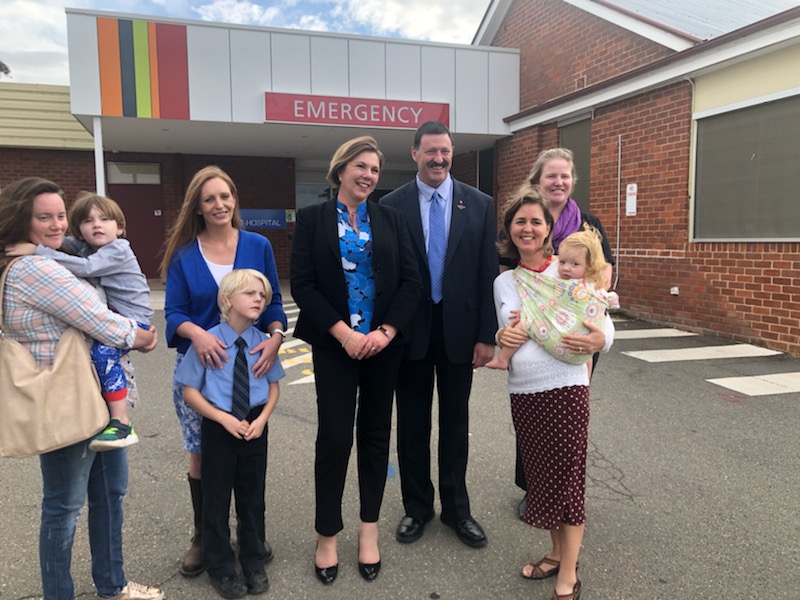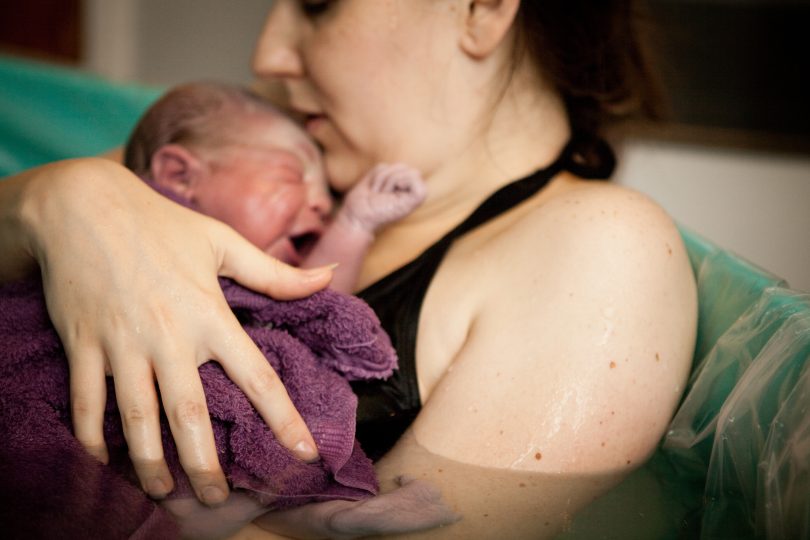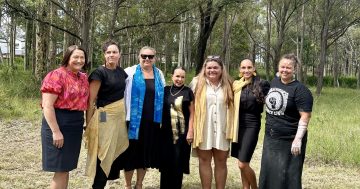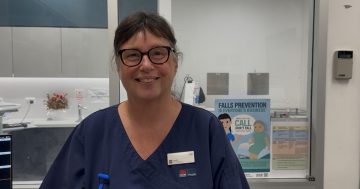
Maternity push: Jasmine Jones, front right, with Labor’s Mike Kelly and Catherine King, and other local women and children outside Yass Hospital during the 2019 election campaign. Photo: File.
Last week was a mixed one for the Canberra region’s women, with a breakthrough in the national capital and yet another male tin ear to an issue that should appall anyone.
The ACT Government’s announcement that it would set up a permanent publicly funded homebirth program after the success of a two-year trial is welcome, although for those of us who began their families as far back as the 1980s it is also bewildering that it has taken this long to provide such an option to ACT women.
While that good news was being celebrated, Prime Minister Scott Morrison answered a question about the lack of maternity services in the booming Yass Valley and women bound for hospital in Canberra giving birth on the side of the road by referring to the $150 million upgrade to the Barton Highway.
”That’s why we’re upgrading the Barton Highway,” he said, before going on to say how NSW spent Commonwealth health money was up to them.
That went down like a lead balloon, and not just in Parliament.
Partly because that badly needed upgrade to one of the state’s most dangerous roads has been pushed back another three years, but mainly because Yass mums would prefer to stay in their backyard instead of wearing out their tyres and themselves tearing down the tarmac for pre-natal care, and eventually giving birth in Canberra’s hospitals, if they make it.
It’s particularly galling for them because Yass District Hospital had a maternity wing until 2004 when the-then NSW Labor Government decided it was too costly and closed it down.
Sixteen years later the Valley is booming, with more than 18,000 people expected to be living there by 2021 and 27,000 by 2036, according to the population forecasts.
A couple of hundred women a year are already making the 60 to 70 kilometre trek to Canberra to have their babies but the current $8 million revamp to the Yass Hospital doesn’t include maternity services.
”Hearing this complete lack of understanding of that from the Prime Minister says everything,” says the woman who asked the question, Labor Member for Canberra Alicia Payne.
”It really is a huge worry. It’s not just the fact that the birth can take a disastrous turn for women and their babies in that sort of circumstance; it’s also the trauma that many women will experience as a result of that throughout their lives. That is something that many women from the Yass Valley have talked about, and it has been covered widely in the media. It is something that this government should be aware of.”

The ACT’s decision to establish a public homebirth program is good news for women and their families.
It enabled her, in the middle of the Eden-Monaro by-election campaign, to recommit Federal Labor to $4.75 million towards restoring maternity services at Yass, an election pledge from last year’s general poll.
Yass councillor Jasmin Jones, who herself gave birth by the side of the road on a dark, cold winter’s morning, has been advocating for the restoration of maternity services for years.
She told Region Media last year the situation was bad for women’s health and bad for their babies, affecting birth outcomes and contributing to post-natal depression.
”It’s just ridiculous when we’ve got a functioning hospital with the proper funding to deliver this service,” she said. ”There is no shortage of midwives, we’ve got midwives living in Yass who commute across the border who would love to opportunity to work locally.
”The statistics prove a midwifery-driven model is the gold level of service for women, and $300 million cheaper to deliver.”
It would certainly save the ACT health system money, and you would think an integrated home-birth program would also be simple to set up with a back-up maternity service at Yass Hospital.
But the effort needed and caution taken to push ahead with the 2017-19 midwife-driven home-birth trial in Canberra shows just how medicalised and risk-averse birth has become, despite study after study showing the health benefits, from post-partum recovery to breastfeeding to mental health, of women having the choice to birth at home.
A combination of doctor-midwife turf wars, steepling insurance costs, and an increasingly litigious environment has virtually wiped out the independent midwives profession.
And with every home birth gone wrong in the media spotlight, many women themselves have been convinced that the only safe way to give birth is in hospital despite rising Caesarian rates and increasing intervention, which carry their own risks.
ACT Health Minister Rachel Stephen-Smith says the government has accepted or accepted-in-principle all of the trial evaluation’s recommendations, and hopefully its narrow criteria will be broadened so as many women as possible can at least have the option of birthing at home.
No, you shouldn’t have to live within 15 minutes drive of Canberra Hospital and yes, a service should also operate out of Calvary for northside women, and yes, it should be open to first-time mothers.
For too long there has been too much emphasis on what can go wrong in childbirth and not enough on what can go right, as part of a hostile zero-sum game in which women and their babies are the biggest losers. Hopefully, the program will normalise home birth as a viable option.
Not every woman will want to birth at home, nor will some be eligible but an integrated, holistic system of care with an emergency safety net in a city with the ease of access of Canberra should be attractive to families and have wider positive impacts on women’s health in general.
The women of Yass can only look on in envy. They just want their maternity ward back.
Original Article published by Ian Bushnell on The RiotACT.










